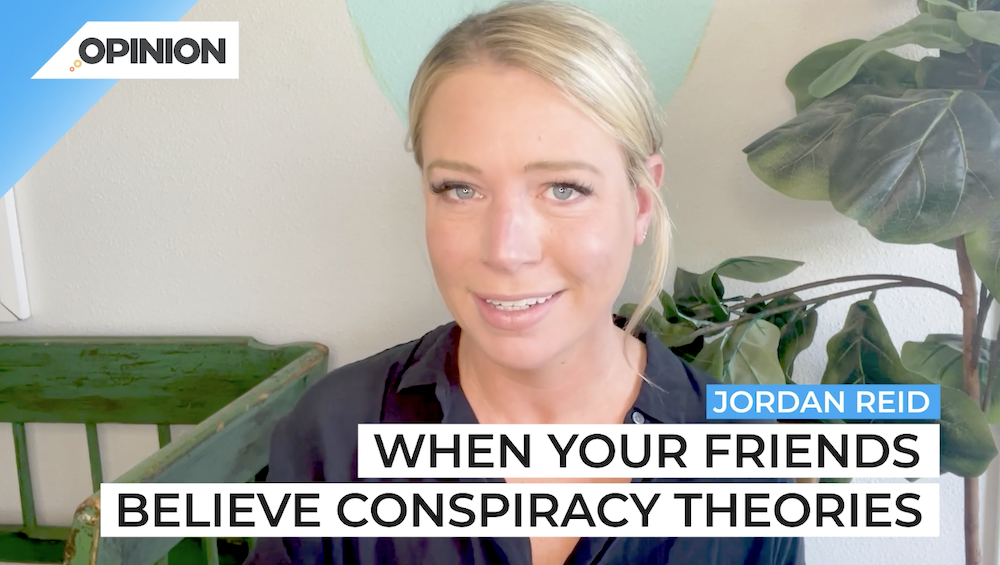
Commentary
-
Our commentary partners will help you reach your own conclusions on complex topics.
I think it’s safe to say that this past year or so has been slightly divisive, shall we say? There’s a lot of anger on the left, here’s a lot of anger on the right, and there’s a lot of people who simply exist in a completely alternative reality. To be clear, there is one reality, and that’s the reality where Joe Biden won the popular vote in a free and fair election that was bi-partisanly declared to be the safest and most secure in our country’s history.
But I digress. What’s been interesting to me has been seeing these alternative realities rife with conspiracy theories coming into my own figurative backyard.
So before we go on, let’s define conspiracy theory.
According to Merriam-Webster a conspiracy theory explains an event or set of circumstances as the result of a secret plot by usually powerful conspirators.
So some of the conspiracy theories currently making the rounds are the ever popular, you know, Hillary Clinton eats babies.
This is a new one — that JFK Jr. didn’t actually tragically die but he’s just been in hiding. And, he’s gonna come back any day now in order to be Trump’s running mate in 2024.
So we can, I mean, we can say that this is funny and it’s, it is a little bit funny, but you have to remember that there are people that really truly believe this. And when you realize that it gets, it gets a whole lot less funny.
And now I live in what could very definitely be called a liberal bubble. I live in California. Most of my friends and family are very left leaning. So it was really surprising to me. You know, I knew that there were like, you know, people out there believe in conspiracy theories, but then I started hearing them come out of the mouths of close friends, people I love and respect and trust. And you know, that really has the potential to throw a relationship into jeopardy.
So what do you do? As an example, let me tell you about a conversation I had with a friend of mine the other day. He mentioned in casual conversation that the Clintons most likely orchestrated the death of Jeffrey Epstein to which I said, no. And he said, well, what do you know? And I said, no, no, that didn’t happen.
Now, yes, there is some mystery surrounding the death of Jeffrey Epstein, ostensibly by suicide while he was in jail.
But the whole, Clintons killed there, like people who aren’t politically advantageous to them, that’s been circulating since 1998. So that’s just like a right-wing fever-swamp kind of situation that’s been going on forever.
But here’s the problem with how I reacted to my friend saying that. I don’t think that my reaction was appropriate or helpful because what I did by shutting him down was I made him feel not listened to. I made him feel laughed at, and within that context, there’s really no way to have a conversation.
What I should have done and later did do, was send over articles from a variety of news sources, sort of explaining where that misinformation had come from. But so, and in this case, it, it worked, my friend believes me.
And, but what do you do if you have someone who just doubles down and just tells you that everything you think, everything you say, everything you read is fake news because it doesn’t come from OAN or Facebook or Fox?
You know, it’s easy to get angry. It’s really easy to get frustrated, but what it’s not easy to do is listen, but you have to remember that the people who believe these conspiracy theories, they really believe them.
And so the only way to create a dialogue with someone with whom you disagree is to listen to them with compassion, respect, and a sincere desire to communicate because it’s only within that dialogue that we maybe, just maybe, might be able to change some minds.
-
Americans must reject Trump to defend our democracy
At the end of the Republican National Convention, Donald Trump accepted the nomination as the GOP candidate for president. In the first part of his acceptance speech, Trump called for unity and healing, although he derailed into partisanship as he continued. Critics have debated the media’s role in handling Trump’s speech. Some argued he was…
-
It’s time for Kamala Harris to pick up the torch
Debates have continued among Democrats about whether President Joe Biden is the best candidate for the 2024 election or whether an alternative Democratic leader might be more electable. While there’s no shortage of fellow Democratic leaders to choose from, President Biden and his supporters have continued to assert that Biden can and will win as…
-
Republicans want to sabotage US education
Former President Donald Trump’s official educational policy platform reveals plans to eliminate the Department of Education and seize the financial assets and endowments of elite U.S. universities. These proposals and others have convinced some liberal critics that the true goal of Republicans is to intentionally weaken U.S. education. Watch the above video as Straight Arrow…
-
Despite poor debate performance, Biden deserves our support
President Joe Biden himself admits that he delivered a “bad” performance in the first 2024 presidential debate. About a week after what some consider to be the worst debate performance in the history of televised debates, polls indicate that more voters than ever have an unfavorable opinion of the president, believe he is too old…
-
The modern-day Republican woman has terrifying role models
In a recent New York Magazine cover story entitled, “How Did Republican Women End Up Like This,” Rebecca Traister writes about some of the more polarizing examples of female Republican leaders and their positions on abortion, the transgender movement and women in general. With Republican women set to play a major role in the November…
Latest Opinions
-
 U.S. Department of Defense
U.S. Department of Defense
Congress still trying to figure out how to reduce wasteful military spending
-
 DVIDS
DVIDS
US Navy, Air Force making waves with new weapons at RIMPAC
-
 Getty Images
Getty Images
Israeli PM Netanyahu meets with Trump at Mar-a-Lago
-
 Getty Images
Getty Images
Growing US nuclear power resurgence reaches the nation’s heartland
-
 Getty Images
Getty Images
Beer from the sun, other solar thermal projects get government funding
Popular Opinions
-
In addition to the facts, we believe it’s vital to hear perspectives from all sides of the political spectrum.


